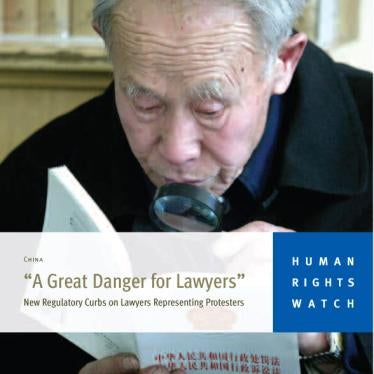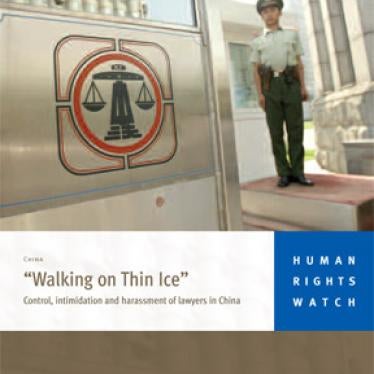(New York) - More than 20 of China's most prominent civil rights lawyers face the possible loss of their right to practice law as an apparent official reprisal for their rights advocacy efforts, Human Rights Watch said today.
Under Chinese law, lawyers and law firms must get their licenses to practice renewed annually, a process sometimes marred by political considerations. These civil rights lawyers say that in recent weeks the Beijing judicial authorities have been trying to pressure their firms not to endorse their re-licensing applications. The lawyers say that the firms' heads have been warned by judicial officials in meetings and telephone conversations about possible adverse consequences for their business if they continue to employ lawyers who take up rights cases.
"Control over the yearly renewal of professional licenses remains one of the main obstacles to the independence of China's legal profession," said Sophie Richardson, Asia advocacy director at Human Rights Watch. "Even when law firms that have been pressured decide to stand by their lawyers, this kind of interference has a chilling effect on the legal profession."
According to an official April 14, 2009, notice from the Beijing Judicial Bureau detailing the registration procedures, lawyers must present their annual applications prior to the end of the registration period on May 31. Lawyers who fail to renew their professional licenses are in effect temporarily disbarred.
A number of the lawyers currently targeted have been involved in some of the most high-profile efforts to date to litigate on behalf of victims of human rights abuses and press for greater accountability from the government. They have represented families of victims of the melamine milk-powder scandal, parents of children killed during the Sichuan earthquake who are pressing for an investigation into the causes of the disproportionately high rate of school collapses, and Tibetans arrested in connection with the massive crackdown in Tibet. Others have been involved in representing HIV/AIDS patients, victims of police abuses, farmers evicted from their land, and Falungong practitioners.
Over the past few years, Human Rights Watch has extensively documented abuses of lawyers, widespread violations of the right of the defense in legal procedures, and a pattern of interference and political control in cases viewed as politically sensitive by the authorities. Although the government vowed to establish new procedural protections for lawyers in June 2008 when it promulgated revisions to the Law on Lawyers, those efforts have been inadequate. No efforts have been made to effectively safeguard the security of lawyers discharging their functions or to allow the government-controlled All-China Lawyers Association - the country's bar association - to play such role.
Human Rights Watch pointed out that instead of the promised reforms to protect the independence of lawyers, detention and physical abuses against lawyers by law enforcement officials have multiplied. In one such incident on May 13, 2009, lawyers Zhang Kai and Li Chunfu were arrested and beaten in police custody in Chongqing after meeting with the family of a man who had died while in a re-education-through-labor camp. The authorities have so far refused to investigate the incident.
"Interference and retaliation against lawyers are direct attacks on the rule of law," said Richardson. "Such actions perpetuate injustices, undermine confidence in legal institutions, and negate the government's own commitment to governing the country according to law."
Beijing lawyers who have reported concerns over the renewal of their license include
Li Heping, Cheng Hai, Jiang Tianyong, Li Xiongbing, Li Chunfu, Wang Yajun, Tang Jitian, Yang Huimin, Xie Yanyi, Li Dunyong, Wen Haibo, Liu Wei, Zhang Lihui, Peng Jian, Li Jinglin, Lan Zhixue, Zhang Kai and Liu Xiaoyuan. Two lawyers who practice outside of Beijing, Wei Liangyue and Yang Zaixin, have also reported threats over their licenses.
To read the December 2008 Human Rights Watch report, "Walking on Thin Ice: Control, Intimidation and Harassment of Lawyers in China," click here.








